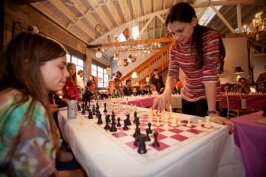Crowning Queens at Chess Fest
By Johanna Willett
Zocalo Magazine

Grandmaster Alexandra Kosteniuk, on the right, at the 2009 9 Queens event at MAST Boutique. Photo: Jeff Smith
Say “checkmate” to chess royalty this Cinco de Mayo at the fifth annual Chess Fest. That is, if you’ve got the right moves.
Tucsonans of all ages and skill levels have a chance to face Alexandra Kosteniuk, the former Women’s World Chess Champion Grandmaster.
Hosted by the local non-profit organization 9 Queens, Chess Fest situates what many see as a quiet game into the heart of downtown Tucson, blending face painting with chess lessons.
“We welcome chess enthusiasts and the closet chess players who don’t always play,” said Jean Hoffman, the co-founder of 9 Queens. “It’s not a traditional chess event. It’s free, it’s outdoors, and it’s downtown. It’s much more of a party.”
Hoffman founded 9 Queens with Jennifer Shahade, a two-time American Women’s Chess Champion, in 2007. Beyond hosting chess events, 9 Queens seeks to empower at-risk youth and girls through chess.
Chess Fest will take over the Hotel Congress parking lot, checkering the asphalt to create a living chessboard that transforms people into a pawn, bishop, or queen.
“Chess is inherently an urban game,” Hoffman said. “In New York City, you see people playing speed chess in the parks. It’s exciting and fun. There’s trash talk, and it’s such a diverse group of people. This fits really well in downtown Tucson.”
Kosteniuk began playing chess at the age of five, and since then, the community aspect of the game has kept her involved over the years.
“Playing [chess] internationally, I wanted to continue to play and see my friends in future chess tournaments,” Kosteniuk said in an email from a chess championship in Turkey. “Chess has allowed me to meet many very nice people and to travel across the whole world.”
A visitor to Tucson in 2009, Kosteniuk was “impressed by the diversity and strength of the Tucson chess community.” Events like Chess Fest popularize chess, and 9 Queens also sponsors chess instruction in schools.
Right now, first and second-graders at Johnson Elementary School periodically get chess as part of their classroom curriculum. Learning to play chess improves problem-solving skills and boosts confidence by providing kids a positive outlet. A four-year study including about 4,200 second-grade students found that students who learn chess experience spurred IQ increases, according to statistics on the 9 Queens website.
“When you teach a kid chess, you’re teaching them how to look at a position and come up with their own plan,” Hoffman said. “It’s the same kind of problem solving that you want people to use off the board in real life—applying for a job, doing school work, whatever.”
Kosteniuk has seen the cognitive influences of chess in her own life.
“I have learned to think before acting and that my actions will lead to consequences,” Kosteniuk said. “Chess has also taught me that you cannot achieve anything without hard work.”
For both Hoffman and Kosteniuk, this is part of the beauty of chess—the equal playing field it creates.
“Only brains count [in chess],” Kosteniuk said. “I am very happy when a kid beats a grown-up and runs to his parents to tell them. I see the parents so proud of their child.”
Kosteniuk will play regular Tucsonans in a simultaneous exhibit, giving Tucson’s kids (and adults) a chance to challenge a champion. Anyone who wants to play can sign up at the festival, and Kosteniuk will play everybody at the same time.
“I cannot think of a hobby that has as many benefits as chess,” Kosteniuk said. “Chess does not care if you’re very young or very old. The only thing that matters is what moves you make.”

Categories: In the News

